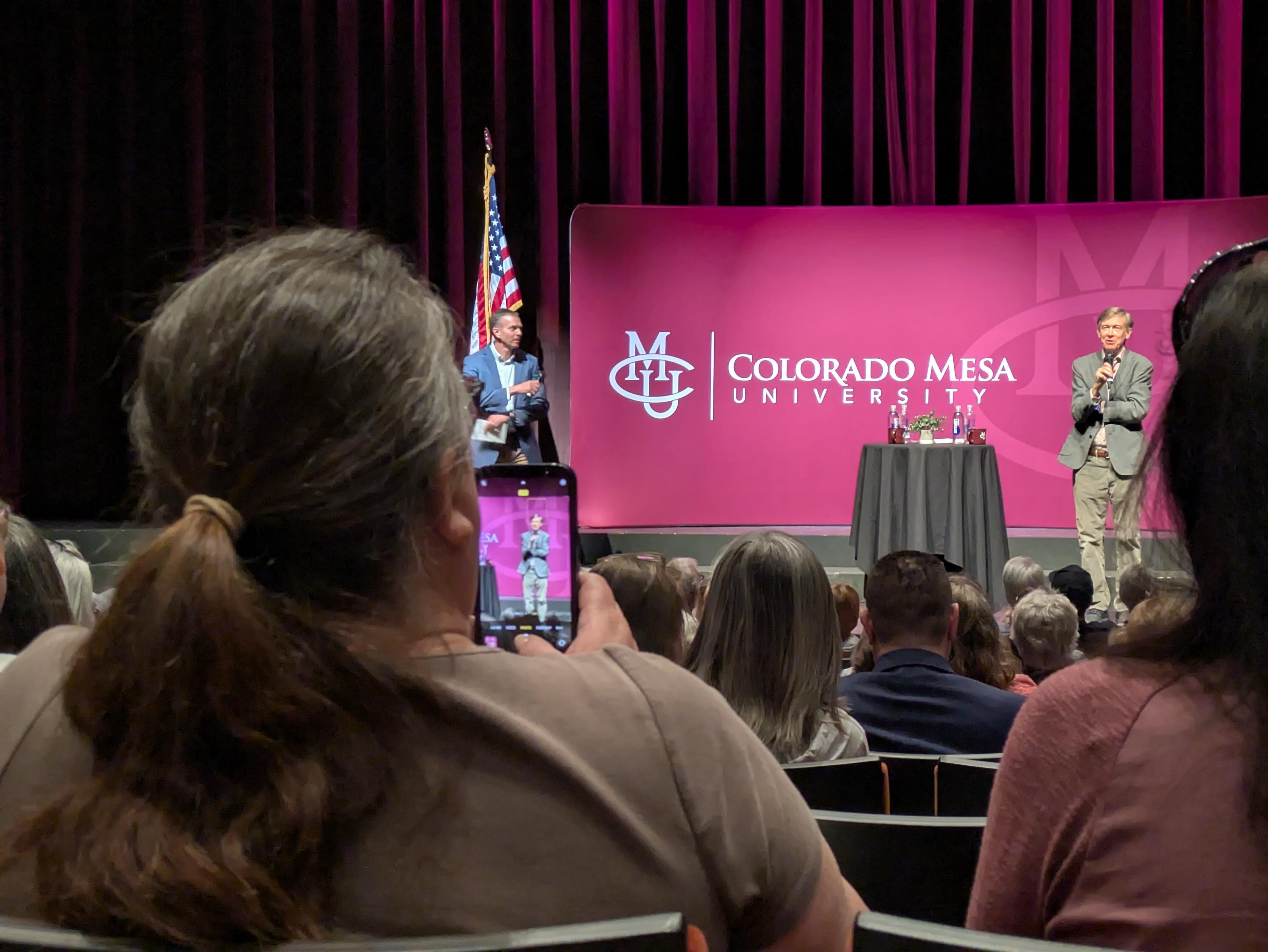
Colorado's Democratic Senator, Michael Bennet, said Wednesday he thinks the Republican health care reform bill announced this week will make it harder for the state's residents to get affordable coverage.
"What they've proposed is a $600 billion tax cut for the very wealthiest Americans that's masquerading as health reform," Bennet told Colorado Matters. "I have long said that there are things I'd like to change about the current health care bill. But I would've never thought that we'd be going in the opposite direction from where we need to go. And this bill clearly does that."
The state's other U.S. senator, Republican Cory Gardner, has not yet agreed to an interview with CPR News. Gardner is scheduled to hold a telephone town hall Wednesday night in which he is likely to be asked about a letter he signed saying he won’t support the American Health Care Act if it causes people to lose Medicaid coverage.
Interview Highlights With Sen. Michael Bennet
On the proposed American Health Care Act taking Coloradans in the opposite direction
"I think that one of the biggest flaws of the current health care bill is that when you are living in rural parts of Colorado and there isn't competition, you've got one insurance provider who's spending ... who's charging you an exorbitant amount of money for insurance and then you've got a very high deductible on top of that, so the insurance becomes useless. Somebody says me, quite rightly I think, 'Why are you requiring me to buy something that's not of use to me?' I think that is a very legitimate critique of the current health care bill."
"What this bill will mean if it goes through is it will be even harder for people in rural Colorado and all across this country to afford their health insurance, especially if they are between the ages of about 40 and 50 before they have the benefit of being on Medicare."
On the position the GOP finds itself in with health care reform
"I think that what they've produced is a political document to try to fulfill the promise that they made over and over again when they repeatedly voted to repeal Obamacare in the House roughly 65 times. And I think what your listeners are going to see over time, if we have time, if they are not able to ram it through, that the legislation is just not going to hold up."
On his vote for SCOTUS nominee, Colorado Judge Neil Gorsuch
"I've said that I'm waiting until we have the hearings and then I'll make up my mind."
Read The Transcript
Warner: Before we get to the Supreme Court, I want to ask you about the Republican House plan to repeal and replace the affordable care act unveiled this week. Senator, I realize it's on the House side, but I wonder if there's anything you can work with -- a starting point in this proposal?
Bennet: Well, I think it sounds to me like they are having a hard enough time getting their own caucus on their bill, which isn't surprising because they've kept it a secret until now. And now they say they want to pass it through both houses of Congress in two weeks. I think they are going to have a huge problem with Republicans on that before they get to the Democrats.
Warner: Well let's see. That was an answer about politics. Let's talk about the substance of what they've offered and whether you think there's a starting point within.
Bennet: I don't think so. I mean, to me, what they've proposed is a $600 billion tax cut for the very wealthiest Americans that's masquerading as health reform. And the only effect that's going to have on people in Colorado is to make it harder for them to get health care, rather than easier. I have long said that there are things I'd like to change about the current health care bill. But I would've never thought that we'd be going in the opposite direction from where we need to go. And this bill clearly does that."
Warner: When you say the opposite direction, care to expound on what you mean on that for individual Coloradans?
Bennet: Sure. I think that one of the biggest flaws of the current health care bill is that when you are living in rural parts of Colorado and there isn't competition, you've got one insurance provider who's spending ... who's charging you an exorbitant amount of money for insurance and then you've got a very high deductible on top of that, so the insurance becomes useless. Somebody says to me, quite rightly I think, 'Why are you requiring me to buy something that's not of use to me?' I think that is a very legitimate critique of the current health care bill.
What this bill will mean if it goes through is it will be even harder for people in rural Colorado and all across this country to afford their health insurance, especially if they are between the ages of about 40 and 50 before they have the benefit of being on Medicare.
Warner: I think that Republicans would say this potentially increases competition and removes a harness from the insurance industry such that rural offerings would increase. What would you say?
Bennet: They might say that. But that's completely imaginary. I don't think that's reflected in the bill, reflected in the legislation, or reflected in reality. I think that what they've produced is a political document to try to fulfill the promise that they made over and over again when they repeatedly voted to repeal Obamacare in the House roughly 65 times. And I think what your listeners are going to see over time, if we have time, if they are not able to ram it through, that the legislation is just not going to hold up.
And Ryan, I don't take any pleasure in that at all. We do have things that we could fix, like what I mentioned earlier to make insurance more affordable to people in this state, to be able to have it be more predictable. And unfortunately, this bill just doesn't do any of that. I mean, this bill doesn't even do the things they ran on. They talked about selling insurance across state lines. They talked about getting rid of the fundamental aspects that President Obama put in. None of that is in this bill.
The one thing this bill does do is cut $600 billion in taxes, mostly for people that make more than $200,000 a year. And the congressional tax group that's looked at this, it's a bi-partisan non-partisan group, has said that the average cut will be $200,000 for each of those taxpayers. That is something we know the bill does.
Warner: Very briefly before we ...
Bennet: Which, and I'll just say Ryan on that point too ... But I think it's very important on that. Because I'm hearing a lot of rhetoric here, not from you but here in Washington, on that point, this will also shorten the time that Medicare is solvent. And it's also going to add to the budget deficit.
Warner: To Judge Gorsuch. Will you vote for him?
Bennet: I've said that I'm waiting until we have the hearings and then I'll make up my mind.
Warner: I know that you had a conversation with him in Washington last month. Was there anything in that discussion that stood out, good or bad?
Bennet: The conversation was in Denver. And it was a positive conversation. He's been a ... he talked about his experience as a judge. And we talked about Colorado.
Warner: Can you get any more specific about something that gave you insight into his views?
Bennet: No, I think it's important for us to have the hearings and then I'm happy to talk about the decision that I reach.
Warner: What questions will you be interested in asking him during the hearings?
Bennet: Well, one thing that I'm going to be interested in is what his view on President Trump's assault on the judiciary is. I think the president has called judges that he's been dissatisfied with, 'so called judges.' He's the first president in American history to call into question the independence of our judiciary. And I'm going to be very interested in hearing his thoughts on that.
Warner: I'll say that Gorsuch, in a conversation with another lawmaker, and this got reported, did express some disappointment in what he was hearing from Trump about the judiciary. Do you want to hear something more explicit?
Bennet: That was in a conversation behind closed doors. And so I'd like to have my own conversation about that.
Warner: I'd like to talk to you about the role ...
Bennet: By the way I was in the, this is very disturbing, I was in the White House when the press called that discussion to the president's attention. And not only did he wave it off, he used it as an opportunity to attack the senator with whom Neil Gorsuch was having the conversation. Very disturbing to see that in the White House.
Warner: I'd like to get a sense of how you see your role as a Democrat and in a minority party. Do you see that as a obstructionist role to oppose the majority party? Do you see it as a role of compromise? And I know that you have some on the left who are saying this is not an administration to compromise with.
Bennet: Well, I feel very strongly that people send us to Washington to get things done. And when we had a president that was in my party, I worked hard with Republicans to advance legislation, pass legislation that was important to Colorado and to others. Reforming the FTA, or reforming immigration -- we obviously didn't get that through the House of Representatives. And I don't expect that to change. I expect to continue to work with Republicans to try to make progress on behalf of the American people.
But where the president of the United States attacks the judiciary, an independent branch of the government; where the president of the United States says that journalists are not covering terrorist acts properly, when journalists are being beheaded covering a story to make us understand better what's going on in Syria, and better what's going on in ISIS, I think I have to have my voice heard. And in an era where people are beginning to talk about it's truth that's been reported, edited content that's on the front pages of newspapers in this country and they are referring to that as false news, I think all of us need to be heard at this moment. This is an assault on our democracy. It's an assault on our democratic institutions. And in my view it has absolutely nothing to do with Republicans and Democrats. It goes far beyond that.
Warner: There's been a lot of pressure on members of Congress to host town halls. Any plans to do that soon?
Bennet: Yes. We're going to do a number of town halls in April, I think, in the next few weeks.
Warner: In the next few weeks. And can you say where those might be? Or are those details to come?
Bennet: We are working on that now. But typically, I say Ryan, they will be in places where there are majorities of Republicans, places where they'll be in majorities of Democrats -- just as we've done in the past.
Warner: Thank you for being with us.
Bennet: Thanks for having me. I hope everyone follows this because this is a really important moment in this country's history. |








